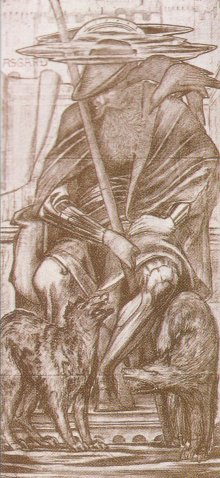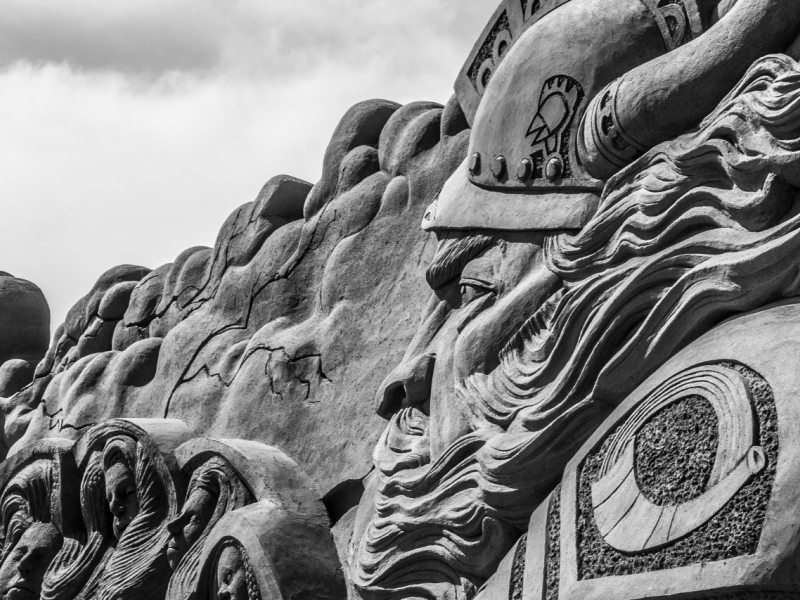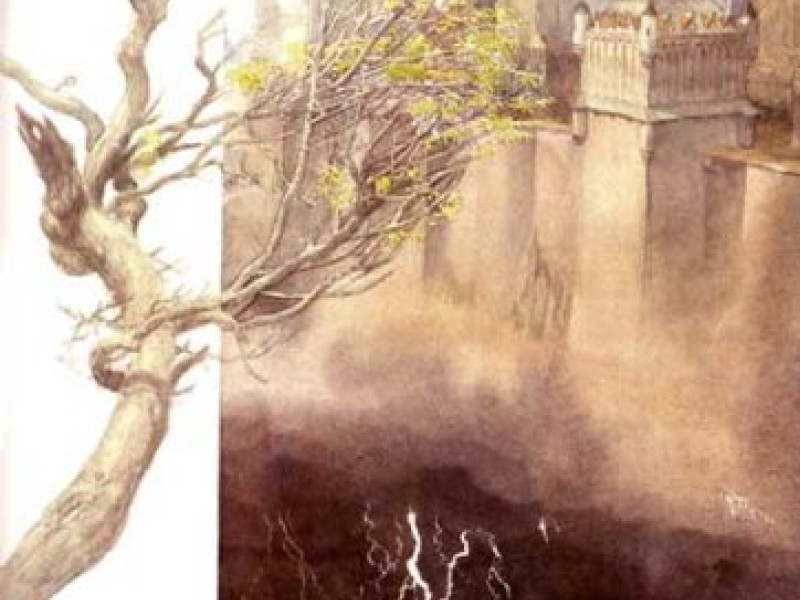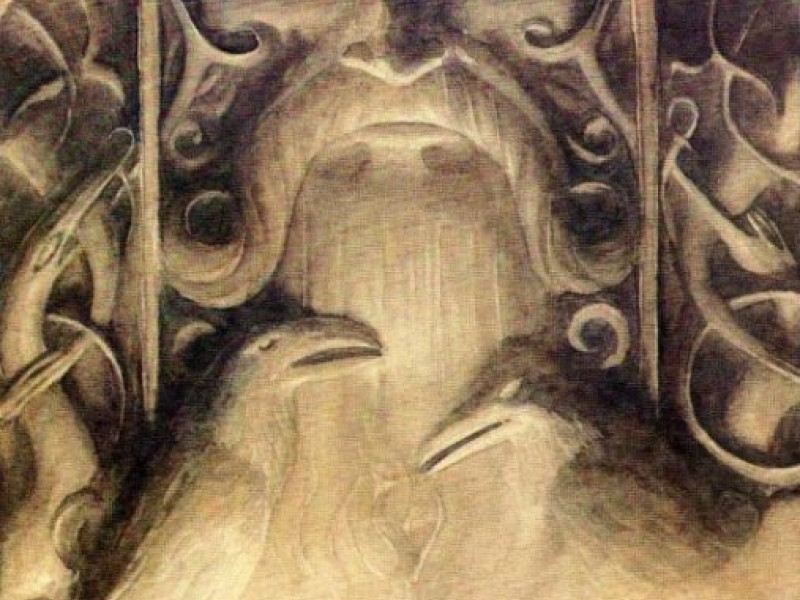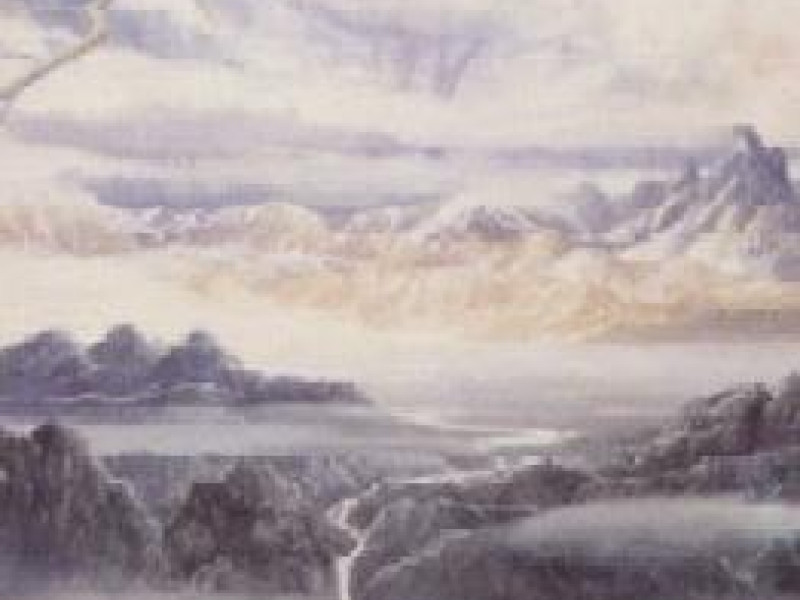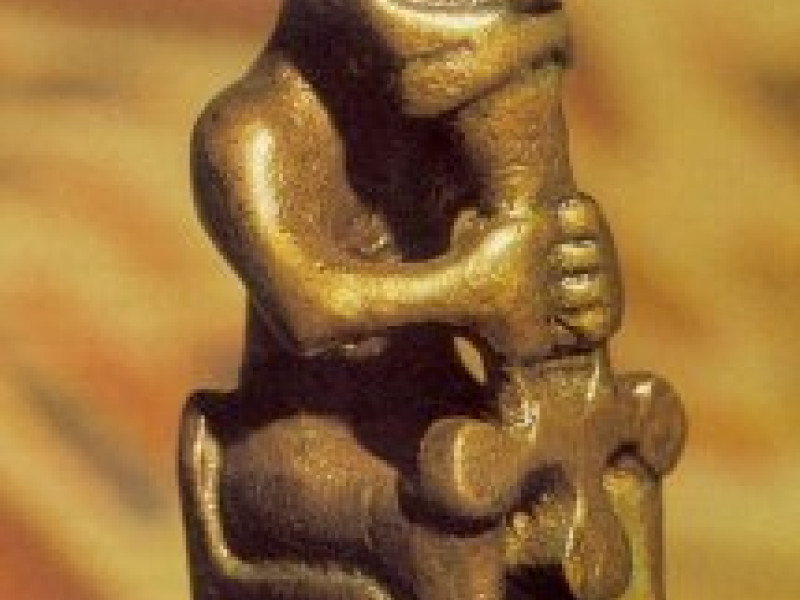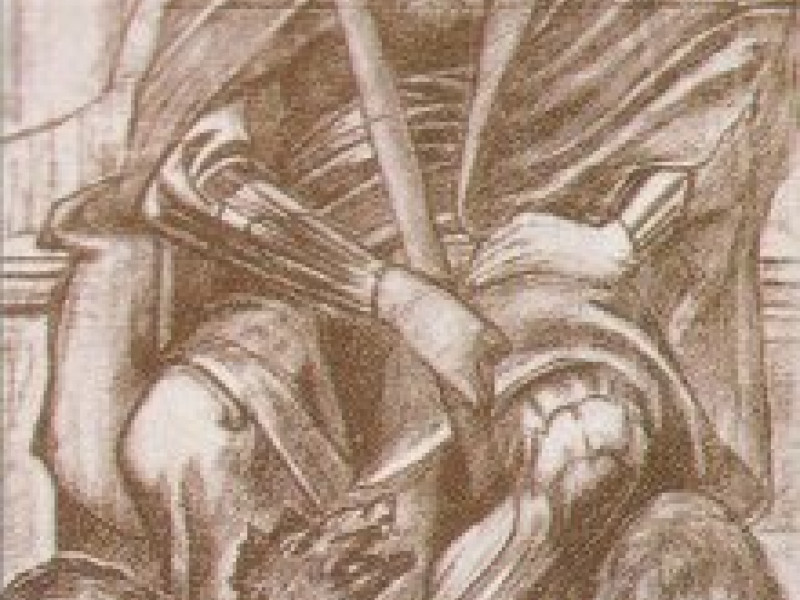Odin
Ruler of universe and leader of the Aesir. Odin was the son of the giants Bor and Bestla. He, along with his brothers, Ve (Lodur) and Vili (Hœnir) created the universe.
When he and his brothers created the first man and woman, named Askr and Embla, each god gave them gift. Odin gave them the gift of breath. As one of the creators of the universe and father of many of the gods, Odin became known as Alfodur ("Father of All"). See Norse Creation.
Odin was the father of many Aesir deities. His wife and consort was Frigg. By Frigg, Odin was father of Baldr, Höd and Hermod. Odin was the father of his eldest son, Thor, by Jörd (Jord or Fjörgyn (Fjorgyn)), a giantess (some say Frigg was Thor's mother). By another giantess named Grid, Odin was the father of Vidar. Odin was also the father of Vali by Rind, daughter of King Billing.
According to the Nordic myths, he was the chief sky god, replacing Tyr who was originally the chief god to the ancient Germanic tribes. He also inherited Tyr's role as the god of the sky and war. Though Odin was the supreme ruler of the gods and men, in contrast with Tyr, he was not trustworthy because in several stories, he would break his oaths.
Odin was more popular with the noble class and the warriors, than with the peasants and working class.
Odin seemed to be a god of war, particularly victory in battle (Sigtyr or "victory-god"); he was the god who could turn the tide of the battle.
Odin was known as Val-father ("Father of the Slains"), since he received half of the fallen heroes in battles, known as the Einherjar. These heroes would wait for the coming of Ragnarök (Ragnarok) in Odin's great hall, called Valhalla ("Hall of the Slains").
Odin had another great hall which was called Valaskialf, that had a roof of pure silver. In this hall was his throne called Hlidskialf, where he could watch the entire world.
He was god of the hanged and was called Hanga. Odin himself was hanged for nine days under the Yggdrasill (World Tree), pierced by his own spear. There he learned the magic of runes and some powerful spells within poetry. See Sacrifice: Hanging and Runes.
Odin wandered the world, accompanied by Vili (Hoenir) and Loki. Loki was often allowed to attend the feast in Asgard, since Odin and Loki were blood brothers. In Norse myths, ties through blood-oaths were sometimes stronger than among kin. Loki often helped Odin, but sometimes his mischievous nature caused more trouble and embarrassment to him and the other gods.
Odin was depicted as a somber and grim bearded god who sacrificed one of his eyes so that he could drink from the well of Mirmir (Well of Wisdom). Odin was also described as the god who wore a wide-brimmed hat and an eye-patch to hide his missing eye.
Odin carried a spear named Gungnir, made by the dwarves (sons of Ivaldi), while his ring called the Draupner (Ring of Power) was created by the twin dwarfs Brokk and Eiti. His symbol was the valknut, a knotted device. Though Odin had given Sigmund a powerful sword called Gram which the drew out of the oak tree Branstock, it was Odin who shattered Gram with Gungnir, when the hero battled the sons of Hunding. Other than Gungnir, Odin armed himself with a golden helmet and a fine coat of mail, which he wore at Ragnarok.
Odin rode a horse with eight legs named Sleipnir, an offspring of Loki (mare) and the giant stallion Svadilfari. It was Odin who appeared to the hero Sigurd, counselling the hero to chose the horse named Grani that Sleipnir had sired.
Since he could only drink wine, he gave all of his food to two wolves, Freki and Geri. Two ravens, Huginn ("Thought") and Muninn ("Memory"), often attended him, carrying tidings of the world.
Odin was also the father of Sigi, who was the grandfather of Völsung (Volsung). (See Völsunga Saga). It was he who put the sword Balmung (made by Wayland the Smith) in the mighty oak tree, Branstock. Only Völsung's youngest son Sigmund could draw the sword out of Branstock. The sword was supposed to allow the wielder to win all his wars. It was Odin who broke the sword in two, before Sigmund lost his final battle. The sword was restored by Sigmund's son, Sigurd. Sigurd renamed the reforged sword to Gram.
Odin had other mortal sons, and he had them establish several powerful dynasties in north and western Europe. I had already mentioned Sigi, who was said to rule over France. There was also Veggdegg who became king of what is now called East Saxony, and Beldegg (Baldr), who ruled in Westphalia. Then Odin headed north, where he came upon called Reidgotaland, but its name was later changed to Jutland. There, his son Skiold began a royal family known as the Skioldungs, and they ruled in Denmark. In Sweden, he set up another son named Yngvi, who established the Swedish house called the Ynglings. In Norway, Odin had yet another son named Sæming, who was the founder of a Norwegian kingdom. See the genealogy of the Houses of the Northern Kingdoms.
Odin could very well be the obscure figure Od, the husband of Freyja, since the name of Odin and Od have the same meaning, "Frenzy". Freyja bore two daughters for Od, but he vanished one day. Freyja shed tears of gold because of his disappearance. Freyja wandered through the world, trying to find her husband.
In the myth about Freyja and the Brísingamen, she was the mistress of Odin.
Odin led a mystical band of horsemen in the Wild Hunt. They roamed at night, from Winter Night (October 31) to May Eve (April 30), particular on the night of the pagan Yule (December 21). If a person saw them, it meant that it was likely to be that person's doom.
In Ragnarök (Ragnarok), Odin would be killed and devoured by giant wolf Fenrir. His son Vidar avenged his death by killing Fenrir.
In Germanic myths, during the time of Romans Odin was called Wodan (Woden). Odin inherited many of Wodan's attributes as well as Tiwaz (Tyr). The classical Roman writers identified Odin (Wodan) with Mercury, because Mercury's day was identical to that of Wodan's day (Wednesday).
Related Information
Name
Odin, Oðin, Odinn, Othin, Othinn – "frenzy" (Norse).
Wodan, Wotan (German).
Woden, Wôden (Anglo-Saxon).
Godan, Wotan (Lombard).
Aldafodur ("Father of All" or "All Father").
Alfodur ("Father of Men").
Valfodur ("Father of the Slain").
Havi ("High One").
Har ("One-eyed").
Sigtyr ("War-god" or "Victory-god").
Gangleri ("Wanderer").
Har ("High"), Iafnhar ("Equal-high" or "Just-as-high"), Thridi ("Third") (three guises of Odin in the Gylfaginning).
Gagnrad ("Advantage-counsel", guise in Vafthrudnismal).
Grimnir ("Masked One", guise in Grimnismal).
Harbard ("Grey-beard", guise in Harbardzljod).
Mercury (Roman).
other names
Baleyg ("Flame-eyed"), Bileyg ("Weak-eyed"), Helblindi ("Hellblind), Farmatyr ("Burden-god"), Fimbultyr ("Mighty One"), Fiolsvid ("Much-wise"), Gauta-tyr, Glapsvid (Maddener), Grim ("Mask"), Herfodur ("Father of the Host"), Hialmberi ("Helm-wearer"), Hroptatyr ("Sage")Herian ("Warrior"), Heriar ("General"), Herteit ("War-merry"), Oski, Sidhott ("Broadhat"), Sidskegg ("Broadbeard"), Sigfodur ("War-father"), Svafnir, Svolnir, Thekk ("Known"), Unn?, Vegtam ("Way-tame"), Vidrir, Vidur, Ygg ("Terrible One").
Related Articles
See also Wodan.
Bor, Bestla, Ve (Lodur), Vili (Hœnir).
Frigg, Thor, Tyr, Loki, Baldr, Höd, Vali, Grid, Vidar, sons of Ivaldi, Fenrir.
Norse Creation, Gifts of the Dwarves, Search for Wisdom, Sacrifice: Hanging and Runes, Mead of Poetry, Head of Mimir, Ragnarök, Otter's Ransom.
Tiwaz, Donar, Mercury.
Runic Alphabets, Norse Festivals.
By Jimmy Joe
